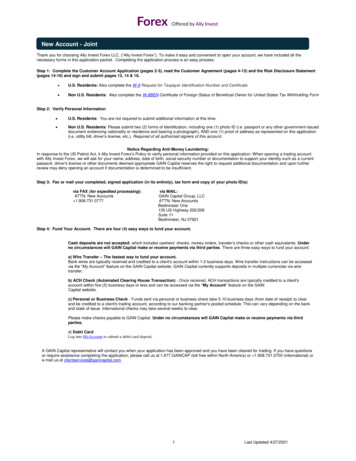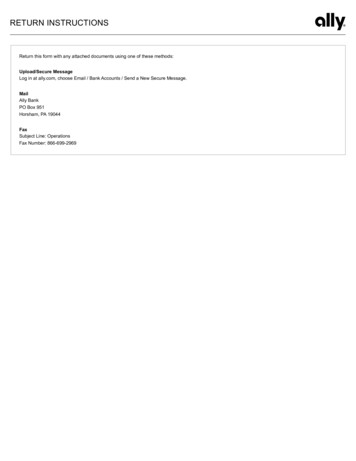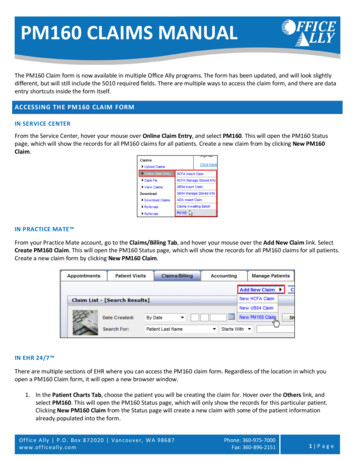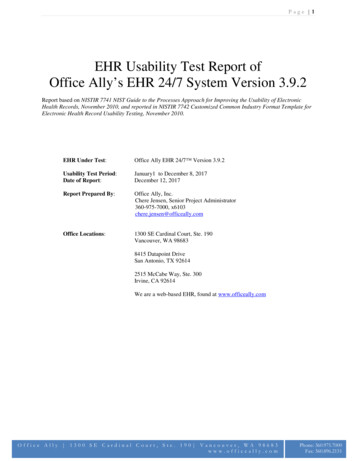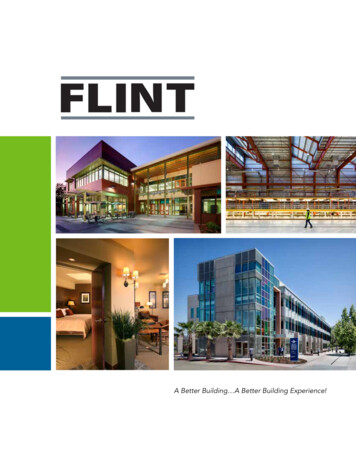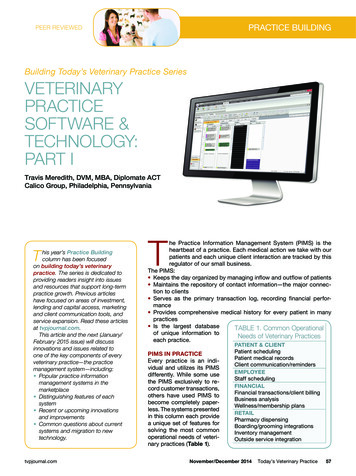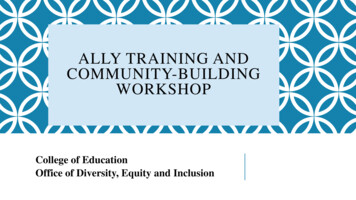
Transcription
ALLY TRAINING ANDCOMMUNITY-BUILDINGWORKSHOPCollege of EducationOffice of Diversity, Equity and Inclusion
WELCOME AND INTRODUCTIONSWho are we in the room? Name Work or Program Setting What motivated you to attend this workshop? What is 1 thing you hope to take away from today?
PURPOSE Facilitate courageous dialogue Promote awareness around identity, privilege, action Learn about allyship and Community Building within College ofEducation Provide Resources for continued learning and practice Hands on exercises to promote transformative learningWHAT ARE YOU HOPING TO TAKE AWAY?
GROUP AGREEMENTSGuidelines for Activity: Challenge by Choice Learning takes place at the crux of discomfort and comfort Engage fully Be present Ask questions Continue learning after this training Remember to breathe Support each otherLet’s Get Started!!!
COMMUNICATION yRespectSelf-ReflectionWhat are some other communication values?
COMFORT ZONE ACTIVITYPurpose:Take a pulse of where each person’s comfort level of the topics and discussions thatparticipants may engage in during this workshop.Instructions:Statements will be listed and you will move in to the zone of the circle that bestindicate comfort with topic.
COMFORT ZONE ACTIVITYGuidelines for Activity: Challenge by Choice Learning takes place at the crux of discomfort and comfort Engage fully Be present Ask questions Continue learning after this training Remember to breathe Support each otherLet’s Get Started!!!
REFLECT
ALLY REFLECTION What images come to mind? Names that come to mind? Examples of Ally Action? Who can be an ally?
ROLE OF ALLYReflectSupport Identify Privilege InterruptCommunityBuilding
WHAT DOES IT MEAN TO BE ANALLY?Warning: this video contains ableist language, referring to blinders” as a mechanism usedto race horses to block out distractions and awareness.
LET’S TAKE A PAUSE What are some difficulties you encounter while exploring yourprivileged identities? How often do you engage in media, literature, conversations withindividuals who hold marginalized identities in your every daylife? What are your interest in being an ally for (indicated group)? What are ways you “mess up” when it comes to being an ally?What is your response when you make mistakes? How do you perform as an ally of groups to which you belong?
WHAT ARE YOU CURRENTLY DOING?Take a moment to complete theRating your Behavior Handout and Diversity Profile Be honest Be reflective What are you currently doing? Work or class setting?
ACTION CONTINUUM Where are you currently located on the continuum? What are your reactions to your current location on the continuum(Surprised? Confused? Further than you expected? ) How did you get to where you are? Is this level consistent throughout all spaces? (i.e. workplace, among familyand friends, social life)
ALLY ACTION GOALS Take a moment to choose a groupyou want to intentionally beginbuilding community and to whomyou want to be an ally. Take this time to reflect anddescribe how you will practice thesetips and actions outlined in the videowhile developing as an ally.
BREAK TIME
SUPPORT:IDENTIFY PRIVILEGE
WHAT ARE SOCIAL IDENTITIES?
DEFINITION OF PRIVILEGE"Privilege exist when one grouphas something of value that isdenied to others simply becauseof the groups they belong to,rather than because of anythingthey've done or failed to do."(Adams, Blumfield, Casteñda, Hackman,Peters, & Zuñiga, Pg. 16. Readings forDiversity and Social Justice)
PRIVILEGE AND OPPRESSIONMATRIXTake a moment to fill out the Privilege and Oppression Matrix around socialidentity
WHAT ARE YOUR PRIVILEGEDIDENTITIES?
WHY IS PRIVILEGE SO POWERFUL? Privilege shows up in the everyday details of people's lives inalmost all social settings and practices. Ability to step in and use privilege identity in order to disruptoppression and create educational opportunities especially when itis a threatening, unsafe and vulnerable for individuals frommarginalized groups to do so. Because you have this privilege, you can hold other people ofprivilege accountable and you will be heard more effectively thensomeone from a marginalized community.
SUPPORT: INTERRUPT
DON’T BE AN ACTIVIST
WHY SPEAK UP?
BYSTANDER INTERVENTION
SPEAK UP-RESPONDING TO EVERYDAY BIGOTRY What can I do among family? What can I do among friends and neighbors? What can I do at work? What can I do at School? What can I do in Public?
WHY DON’T PEOPLE INTERVENE? Don’t know what to say? Lack knowledge Risky Vulnerability Don’t feel It will make adifference No one else is doing it? Not my job! Not my problem? Threatening Culturally inappropriate*
WHAT HELPS PEOPLE INTERVENE? Knowledge of what constitutes ism Awareness of impact of ism Perception of responsibility Desire to educate and engage incourageous conversations Emotional responses to oppression Self-affirmation Anti- ist social norms
WHY TYPES OF ACTIONS DOPEOPLE TAKE Confronting or disagreeing with the agitator Calling it “racism,” “transphobia,”“sexism,” “discrimination,”“microaggression, etc. Interrupting stories, actions andbehavior EACH TIME Distraction Express upset feelings Seek assistance
PRACTICE ACTIVITYPair up!
WHAT ROLE DO YOU PLAY IN CHANGE?HelperAdvocateRebelOrganizer
SIX STEPS TO SPEAKING UP AGAINSTEVERYDAY BIGOTRYBe ReadyIdentify the BehaviorAppeal to PrinciplesSet LimitsFind an Ally/Be an AllyBe Vigilant
BREAK TIME
COMMUNITY-BUILDINGMoving Forward
WHAT IS COMMUNITY?How do you define community? To what communities do you belong? What do you value about being apart of a community? How do you participate in a community?
COMMUNITY-BUILDINGCommunity Building is about people form the community, government, business andacademia working in collaboration to create and take steps towards solutions orissues impacting the connectedness and functionality of the communityEvaluation of where the community is currentlyWhat works and what does notAspirations of where the community would like to be in the futureAddressing the needs and changes that need to happen in order for change tooccurHonest acknowledgement and appreciation of diverse partners, members,background, skills, talents, opinions and enlisting them as part of steps towardseffective change
COMMUNITY-BUILDING:PURPOSE What is your purpose in the COE community What values do you bring to the COE community? What impact do you have on the COE community? What are the biggest challenges in Community Building in the COE?
HOW WILL YOU CONTRIBUTETO BUILDING A COMMUNITY INTHE COLLEGE OF EDUCATION?What is your role?
COMMUNITY-BUILDINGSTRATEGIESHow will you contribute to communitybuilding in the College of education inthe following (3) areas: Personally Professionally Collectively
WRAP-UP
ALLY TRAINING AND COMMUNITY -BUILDING . Office of Diversity, Equity and Inclusion. WELCOME AND INTRODUCTIONS Who are we in the room? Name Work or Program Setting What motivated you to attend this workshop? What is 1 thing you hope to take away
